In the Age of Vibe Coding, How Much Do Programming Skills Still Matter?
Prompt engineers are taking over and cashing in

AI skills are gaining ground: The share of postings mentioning AI is increasing as employers seek talent capable of integrating AI into product development, operations, and decision-making processes.
Programming skills remain valuable but are losing ground. While programming skills still command the highest salary premium, their presence in new postings has declined as AI tools automate coding and shift demand toward AI expertise.
Among AI skills, applied AI delivers the fastest pay growth. Momentum is strongest in skills that turn AI into practical products and workflows, reflecting employers’ focus on implementation over core ML and AI research.
Skill requirements are constantly evolving. What are the most valuable skills in the market right now? This week, we use our skills data extracted from billions of job postings to identify which skills command the highest pay and which are growing fastest in terms of salary growth. From programming languages to emerging AI specializations, the findings show where employers are paying a premium and what the next wave of in-demand expertise looks like.
Based on the raw skills extracted from billions of job postings, we apply our latest skill taxonomy to map them into standardized skill groups. At the most granular level, the skill taxonomy contains approximately 30,000 distinct skill groups, which are then categorized into broader domains such as programming skills, artificial intelligence and machine learning skills, domain-specific expertise, business software, professional certifications, leadership and management, communication and business operations, interpersonal and soft skills, and foreign language skills.
To start, we examine how the distribution of job postings has shifted across major skill domains, with a focus on AI and programming—the two most discussed technical skill areas shaping today’s labor market. The data reveal a clear shift in demand: AI-related skills now appear in a growing share of new U.S. postings, reflecting the rapid spread of AI tools across business functions. Employers are integrating AI capabilities beyond development teams—embedding them in product, operations, and decision-making roles. Meanwhile, programming skills feature in a smaller fraction of postings than they did a year ago, suggesting that AI is streamlining coding work, making development more efficient, and reducing the demand for traditional programming skills.

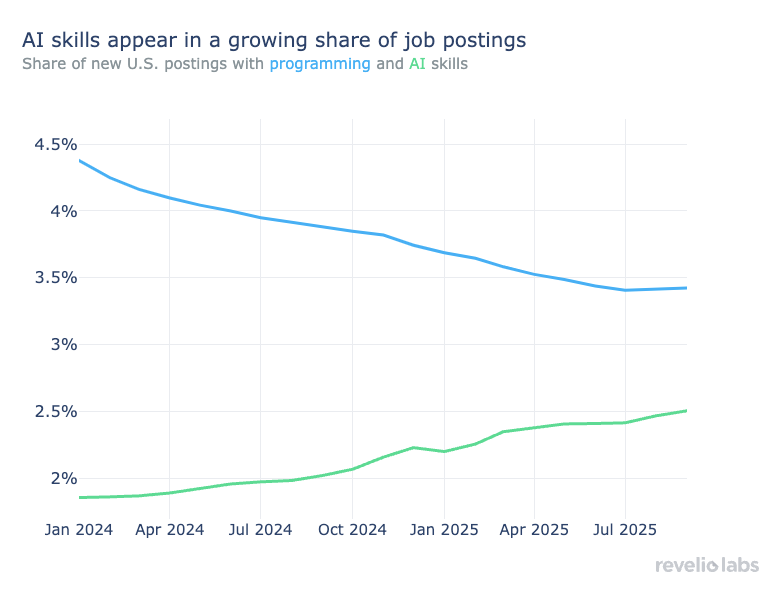
Looking more broadly across skill domains, AI-related skills continue to gain traction relative to other categories. The chart below shows the share of new U.S. postings in 2025 that list each broad skill group. Professional certifications and AI-related skills now appear in a larger fraction of postings than a year ago, indicating that employers are placing greater emphasis on verified credentials and AI literacy. The increase in demand for certifications aligns with the supply-side trend we observed in our previous study, which showed a surge in certifications, particularly in technology and data-related fields, underscoring employers’ preference for verifiable skills in uncertain times. At the same time, demand for previously essential competencies such as business and productivity software (Microsoft 365, Oracle, CRM tools) is beginning to decline, consistent with the rise of AI tools that automate many of these routine tasks.

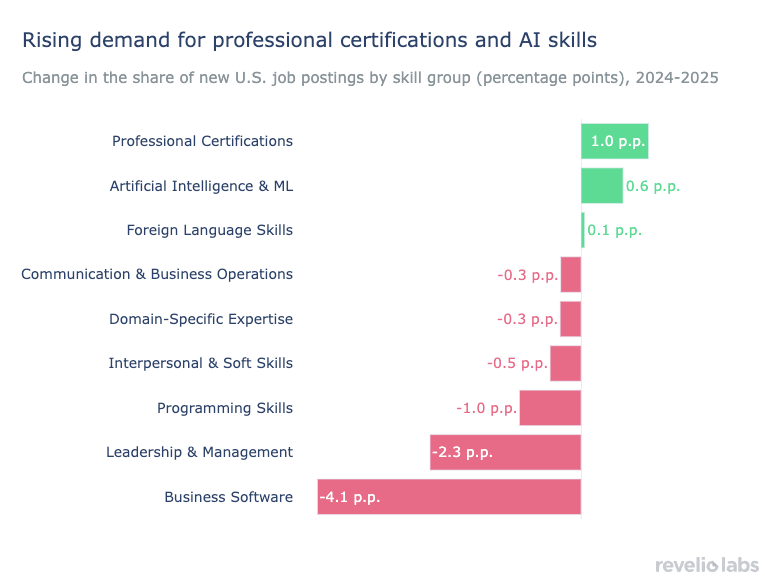
To evaluate how these skills relate to compensation, we randomly sample 1,000,000 job postings from positions listed in the United States in 2025. We run regressions of salary on skill tags, controlling for state, industry, role, and seniority fixed effects. This approach isolates the independent contribution of each skill to advertised pay, net of job type and geography. We find that, holding all other factors constant, job postings listing programming and AI skills are associated with the highest salary premia—8.2% and 6.2%, respectively. These results suggest that employers continue to place a substantial wage premium on technical capabilities that directly enable automation, data-driven decision-making, and advanced software development.

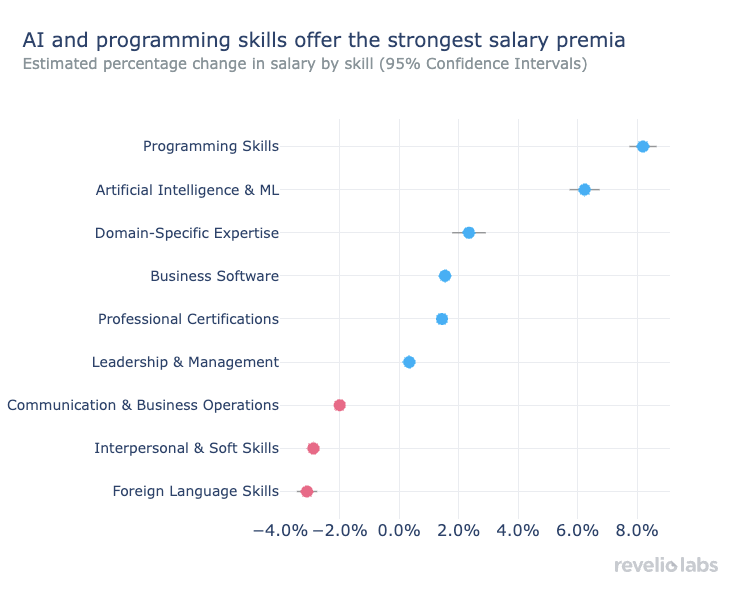
When examining the highest-paid AI and programming skills in the U.S. in 2025, clear patterns emerge as to where employers place the greatest value. The most lucrative AI skills revolve around AI strategy and core machine learning, reflecting strong demand for professionals who can plan, manage, and integrate artificial intelligence within organizational goals, as well as those who can build and scale advanced AI infrastructure. On the programming side, Microsoft Visual C# and Objective-C continue to command high salaries because they power many large, established enterprise systems with a shrinking pool of experts. Meanwhile, Rust, Swift, and Scala also rank among the top earners, underscoring the value companies place on fast, safe, and reliable code for modern backend and high-performance computing environments.

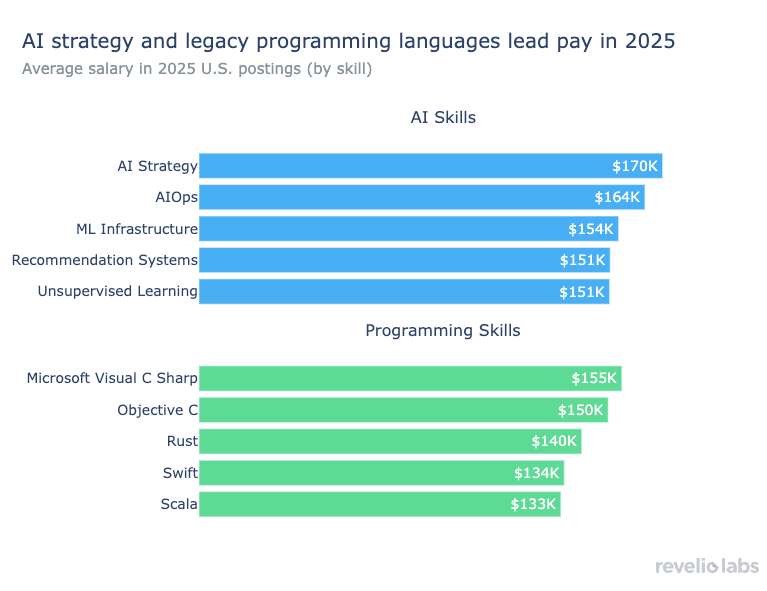
Salary growth tells a related but forward-looking story. The fastest-growing salaries for AI skills are more application-oriented, reflecting the industry’s shift from research breakthroughs to real-world integration. Skills such as AI Markup Language, AI Prompting, and the OpenAI API are gaining ground quickly as organizations focus on deploying AI products and connecting large language models to business workflows.
On the programming side, the strongest salary growth is found in niche and legacy areas such as IBM Assembly, Quartz Composer, and 8051 Assembly, where expertise is scarce but still needed to maintain specialized systems. Lua and PHP Applications also appear among the top growers, showing steady value for lightweight scripting and web automation, even as newer technologies such as Rust, Go, Kotlin, and TypeScript dominate attention.

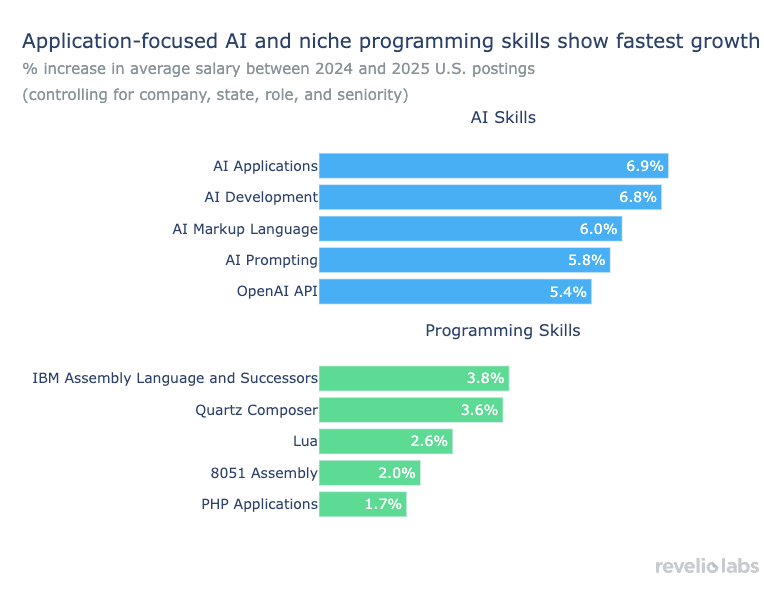
When assessing both the highest-paying skills and those showing the fastest salary growth, we find that while infrastructure-heavy AI expertise continues to command the highest salaries, the strongest pay momentum now centers on applied innovation—skills that bring AI capabilities into practical use. In programming, both high pay and pay growth reflect scarcity in legacy and specialized domains where experienced talent remains limited but essential. Yet as programming-related skills appear in a shrinking share of new postings, these legacy technologies are becoming less promising investments for job seekers. Instead, developing skills in AI application, governance, and strategy will offer the strongest prospects for long-term relevance and opportunity.


